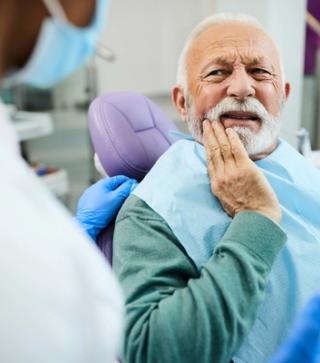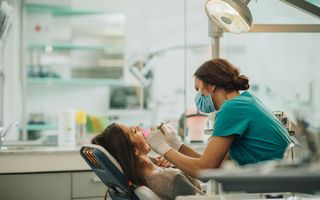
Sometimes, your oral health simply can’t wait until your next dental check-up. Dental emergencies are relatively common and need immediate attention just as much as any other health emergency.
This could be anything from tripping over and breaking your teeth to suddenly experiencing severe dental pain. Whatever the case, it’s best if a professional can assess, diagnose, and treat your teeth as soon as possible for your oral health.
What is a dental emergency?
Emergency dental care is available for when you need to see a dentist urgently. Usually, an emergency involves any kind of pain or discomfort that can’t be treated with a simple over-the-counter painkiller, or any kind of tooth breakage.
By arranging an emergency appointment, your dentist will be able to assess the problem and offer an immediate solution that improves the pain and ensures the damage is minimised or even reversed.
However, not all emergencies of the mouth are suited to the skills of your dentist. You may need to go to the emergency department at your local hospital. If you are unsure if your issue is an emergency, please call the practice to discuss.

What services does emergency dental cover?
An emergency dentist can help with a variety of dental emergencies, this could be for:
- A chipped or broken tooth
- A persistent or very painful toothache
- A lost filling
- A loose or knocked-out adult tooth
- Emergency tooth extraction
- Broken braces
All of these issues are emergencies because they require immediate attention. For example:
- If your filling falls out, your tooth may be exposed to bacteria that could lead to an infection, and your tooth could be weakened, which could lead to a break or chip.
- If you have braces and they break, this can result in a wire or piece of bracket poking your mouth or gums, which can be very uncomfortable, so it’s best to have it fixed as soon as possible.
- If you have a very painful toothache, it could be that there is an infection inside the tooth that requires antibiotics or other treatment to stop it from spreading or causing damage.

The advantages of emergency dental treatment
Emergency dental services are beneficial for several reasons:
- Pain reduction and management: An emergency dentist can help to diagnose the cause of pain and help to treat it right away
- Damage minimisation: Immediate attention can help to minimise any damage to the tooth, gums, and your oral health
- Avoid higher costs and more treatments later: In some cases, immediate attention can help you avoid more treatments and higher costs down the track.
What to expect from an emergency dental appointment
An emergency dental appointment will vary depending on your emergency, but here’s a general idea of what to expect:
- Call ahead to let your dentist know you are coming so they can try to prepare for you, and ensure you are going to the right place (in some cases, you may be redirected to a hospital)
- If your nearest dentist does not have space, try calling more dentists nearby to see if they can help
- Note that a dentist cannot come to your home, but most dental offices provide emergency services during normal working hours, so you should have options nearby
- When you arrive, your dentist will rinse or clean the affected area
- They will perform a visual inspection and may take X-rays if required
- They may provide pain medication or anaesthesia if required
- They will either treat the issue immediately or do a temporary fix until you both have time for a more permanent solution
- Your dentist may prescribe you with a round of antibiotics if an infection is involved or likely
- They will provide you with follow-up care instructions
We place a high importance on dental emergencies as dental pain can be distressing.
Our team will endeavour to provide you with a same-day appointment and prioritise your care. If you are experiencing a dental emergency, please contact us as early as possible for us to try and get you seen on the same day.
Frequently asked questions
The cost of emergency dental services can vary greatly, depending on the issue. It truly depends on the extent of the damage, the time it takes to fix it, the tools and materials used, whether you require anaesthesia or not, and other factors.
Generally speaking, Medicare does not cover emergency dental treatments. However, some private health insurance providers do offer some coverage for emergency dental services. For example, a provider might give you a rebate of 60% of the cost of care, or cover 100% of the cost but only up to a certain amount per calendar year.
Some insurance providers will also have preferred providers for dental services, which is fine for standard dental care, but can be more difficult to ascertain which dental clinics are ‘preferred’ when you are having an emergency.
It’s best to fully read and understand your health insurance clauses when it comes to emergency dental care well before you need to use them.
Any issue regarding your teeth or gums that requires immediate attention can be considered a dental emergency. This includes anything that’s persistently painful, anything that bleeds without stopping, or any problem that exposes the soft inside of the tooth.
This could be:
- A broken, chipped, or cracked tooth
- A loose adult tooth
- A knocked-out tooth
- Broken braces that cause injury
- A persistent, painful toothache
Yes, if your toothache is getting in the way of you eating, drinking, or enjoying life, you should have it checked as soon as possible. It could be due to an infection or nerve damage, and your dentist will be able to inspect the site, make a diagnosis, and help treat the cause of the pain.
Generally, no. If you need a tooth pulled you are best to go to your local dentist. In some cases, an emergency room may have a consulting dentist on site who could help if necessary, but you are likely still better to visit your nearest emergency dentist.

